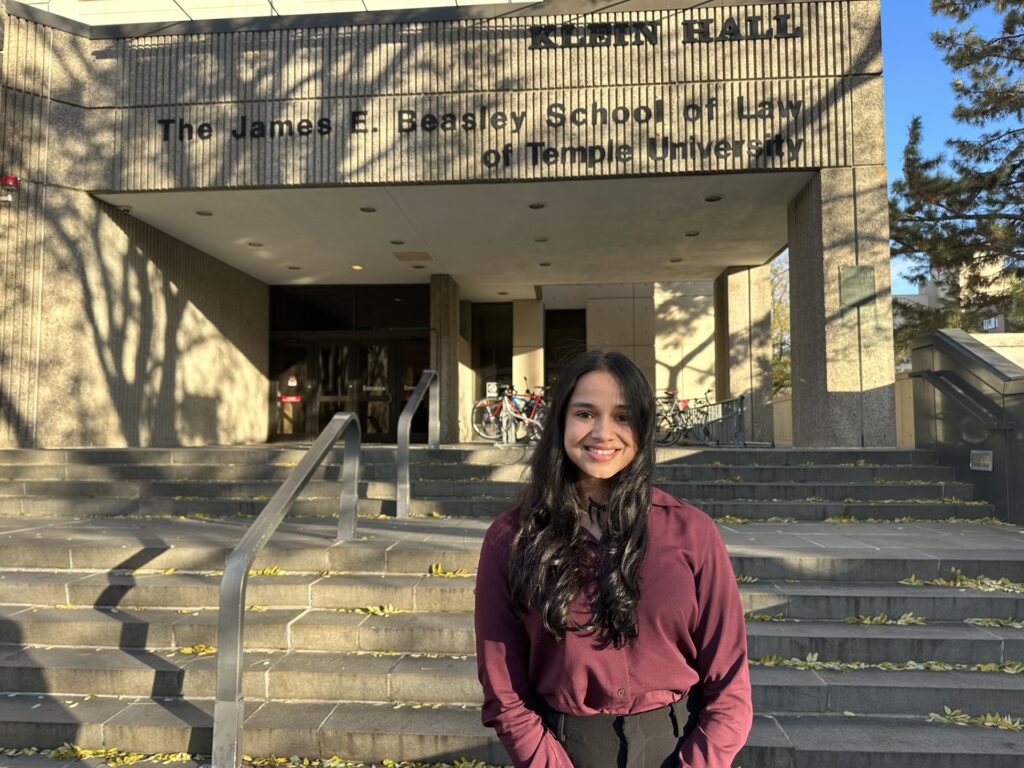On October 13, 2023, the Supreme Court of India issued an order clarifying Section 12A of the Indian Commercial Courts Act, setting an important national precedent on the defendant’s right to mediation before commercial litigation thanks to efforts led by new Temple LL.M. alumna Shraddha Chirania.
Chirania first studied at Temple Law as an exchange student in the Fall 2019 semester while a student at Temple’s partner school, O.P. Jindal Global University. To Chirania, Temple was an excellent fit because she could study a variety of subjects, rather than just one specialty. “I have taken courses in different fields, which gave me perspective on what I wanted to do after graduation,” she said.
Chirania speaks fondly of her experiences at Temple, where she made some of her closest friends, all from different countries. Her study abroad experience helped her realize “how different India and the U.S. are, and how similar they are. There are a lot of parallels that I could draw.” Temple’s focus on trial advocacy inspired her legal work in India and ultimately her return to Temple to complete her degree.
In between her exchange and final semesters, Chirania practiced law for nearly two years in India, gaining experience in a variety of matters. In one case, she represented a defendant in a trademark application case. Chirania and her colleague Kartikey Bhatt came upon a “legal vacuum” in Section 12A of the Commercial Courts Act, which mandates that mediation must be held before a commercial case is filed.
The plaintiff in this case wanted to skip mediation, which put Chirania’s client at a disadvantage. The plaintiff tried to exploit a loophole in the law, which allows a plaintiff to bypass mediation in urgent cases, citing a Delhi High Court ruling that the plaintiff has the exclusive right to determine urgency. Chirania wanted to close this loophole to advocate for the defendant’s right to a fair process.
When Chirania made no progress with the Delhi High Court, which upheld the plaintiff’s exclusive right to determine urgency, she filed an appeal with the Supreme Court of India, which ruled in her client’s favor, saying that urgent interim relief cannot be a reason to avoid pre-litigation mediation, especially when falsity or deception is present.
The successful resolution of this case and its influence on nationwide law inspired Chirania to continue her studies at Temple, where she returned for the Fall 2023 semester to complete her LL.M. degree. She said she returned to Temple because of the program’s flexibility, allowing her to fast-track her degree using credits earned during her exchange semester.
The LL.M. degree “is such an amazing opportunity, because it offers international students the ability to complete a degree faster,” she said, adding that “faculty and staff go above and beyond to help you, particularly Professor Gokhan Tolay, Director of International Law Programs Karen McMichael, and Assistant Dean for Graduate and International Programs John Smagula.”
“Temple offers many opportunities for experiential learning to domestic and international students alike,” she said. While studying in the LL.M. program, Chirania gained hands-on experience at a firm in the United States through the Ethics in Practice course, where she collaborated with Weihong Hsing (JD ‘05) at Ice Miller LLP.
When asked what motivated her to persist with her Supreme Court case, Chirania responded, “I felt empowered to do it. If not me, then who else?” Encouraged by her colleagues and driven by Temple’s motto “perseverance conquers,” Chirania’s efforts led to a change in the law of the land and have placed her in good stead to advocate for additional changes in the future.

